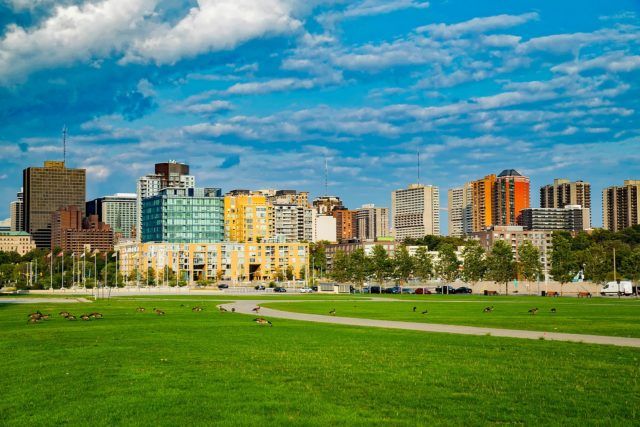Extending from the Atlantic Ocean on the east coast, to the Pacific Ocean on the west coast, Canada borders America to the south and the Arctic Ocean to the North.
Covering an area of over 9.9 million square kilometres, Canada is the largest country in the Western Hemisphere and second only to Russia as the largest country in the world. It is also a prime spot for expats.
In this guide, we will take a look at the very best (and worst) of Canadian life. Are you considering a move to Canada? Read this before you commit to a new life overseas.
Contents
Why Move to Canada?
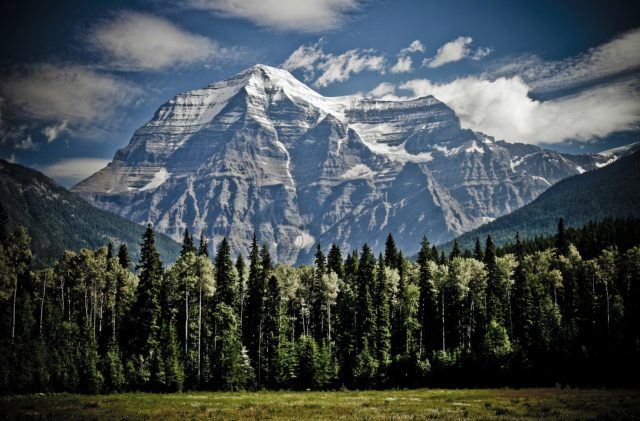
A Guide for Moving to Canada from the UK
Canada has one of the most unique landscapes in the world.
With a population of just 36.4 million people, the density of the population of this vast country is largely due to the high proportion of uninhabitable or inhospitable land mass including vast swathes of tundra, forests and, of course, the Rocky Mountains.
Around 80% of the population live along the southern border of the country in urban settlements including Vancouver on the west coast, Toronto, Ottawa, Montreal and Quebec City on the east coast.
The country has been inhabited by indigenous Inuit, Metis and First Nations for millennia and their influence shapes the traditional and cultural backbone of Canada. From colonisation of Canada by the Europeans, most notably the British and French, in the 16th century to ongoing mass immigration has helped forge a modern country that boasts a rich and ethnically diverse population.
For such a developed country, Canada is largely unspoilt and offers some idyllic landscapes, immersive natural wonders and plentiful opportunities for adventure.
Ranking 9th on the human development index, Canadians benefit from high nominal per capita income, civil liberties, quality of life and excellent standards of education. The economy is the 11th largest in the world and is very stable having strong international trade connections. Canada relies on the United States for much of that trade and the relationship between the two countries is peaceable and strong.
The English have been emigrating to Canada since colonisation of the country began in the 16th century which various events triggering large-scale immigration including gold rushes, advertising campaigns to attract migrants and the First and Second World Wars.
A part of the Commonwealth, Canada shares the Queen Elizabeth II as its head of state and the country retains much of its British past which continues to make the country an appealing and easy transition for emigration.
The French influence in the country is also dominant with French being the official second language. Areas of Canada such as Quebec City are heavily populated by French Canadians who make up around 20% of the country’s total population.
Canada Visa Requirements for Brits
Visiting
UK citizens are exempt from the necessity of a visitor’s visa when travelling to Canada. However, like the USA, you are required to complete an electronic travel document. This visa waiver remains valid for five years and can be applied for online as long as you have an electronic passport. Visitors can stay in the country for up to six months. Extensions to this period must be submitted to the border services at least 30 days before the expiration of your six-month stay.
Working
There are numerous ways to apply for work visas for Canada including:
- Start-up Visa
- Immigrant investors
- Self-employed
- Caregivers
- Express entry for skilled workers
- Quebec selected skilled workers
- Family sponsorship
Each type of visa application is straightforward yet has certain eligibility requirements. Most applications will need to see full details of your intended employment (or business start-up) as well as proof of your ability to be self-sufficient whilst living in Canada. The eligibility requirements are less onerous than those prevailing the USA with Canada actively seeking skilled workers in certain sectors as well as entrepreneurs and investors.
Citizenship
Gaining Canadian Citizenship can be done after a period of six years has passed since you gained permanent resident status. You must be able to demonstrate that you have spent no less than four of those years in the country. In addition to being able to speak English or French, you must prove that you intend residing in the country permanently, that you have completed and returned your income tax returns and demonstrate a sound knowledge of the history, values and symbols of Canada.
Way of Life in Canada
Lifestyle
Just like the Brits, Canadians love their sports, animals, barbecues, pubs and families. They also share a similar reserved nature and have a habit of apologising without reason as well as having a preoccupation with discussing the weather. You will find that the Canadian culture has more in common with British culture than American and they tend to share a similar sense of humour; however, there are plenty of differences too.
Ice hockey is more than just a sport in Canada, it’s a way of life and a great way to socialise with people who have lived here for a long time (either expats or Canadian born locals). Many families like to get away from the cities at the weekend and head to rural cottages. This is particularly common with families and friends. Again, this can be a great way to get to know people.
Because Canada is such a vast country many people do not go abroad on holiday but choose to explore other aspects of the country. From experiencing the Northern lights in Newfoundland to whale watching on the west coast or taking a trip across the interior, there is plenty of adventure on offer. However, flights can be more expensive than the low-cost budget airlines we are used to here in Europe.
Just like in the United States, tipping is a huge part of the culture and lifestyle in Canada. To leave a bar or restaurant without tipping the waiting staff is considered offensive and will not make you popular. Most waiting staff can only make their living from tipping so bear that in mind whenever you are handed a bill.
The UK state pension is payable in Canada which can make the country a popular destination for retirees. However, it is worth noting that, unlike claiming this benefit in the UK, you will not be eligible for annual increases.
Dress
Canada, as a Western nation, has no particular rules or public conservatism over dress codes however public nudity is not expected, even on beaches (should the weather allow) and casual clothing is fine for most occasions. Formal functions will require smart dress but otherwise you should dress according to the prevailing weather conditions. That said, if you are situated in the north of the country or expecting to endure a harsh weather then it is worth investing in quality thermal clothing and a decent winter coat.
Getting Around
The public transport system in Canada consists of trains, ferries, buses and three rapid transport systems in the major cities; the Toronto Subway, Montreal Metro and Vancouver SkyTrain.
The rail network is underutilised with most usage across the extensive network being put to commercial usage rather than intercity passenger travel. Trains do run between cities but are slower and as expensive as using buses or cars. Commuter networks are used in Vancouver, Montreal and Toronto with the latter also having a streetcar system. Light railways exist in Alberta, Ottawa, Edmonton and Calgary which does ease traffic in the cities.
There are a good many bus operators with Greyhound offering the most extensive service across Canada as well as into the USA. Fares are very reasonable and you can save 50-70% on air fare by travelling via bus. The 4,400 km journey between Toronto and Vancouver would cost £350 by air and take around 5 hours whereas a bus ticket would cost around £160 yet take 65-70 hours to complete. For this you would need to factor in a few nights at motels; for some the experience of travelling across country is worth the extra time involved.
Driving in Canada
Canadian drivers have a reputation for being pushy and erratic; speeding and tailgating are common as well as signalling as they make a manoeuvre and not before.
The road network extends to Alaska in the north and connects the USA in the south. The conditions and maintenance standards are good.
Canadians drive on the right-hand side of the road.
You can use your UK driving license for a limited period whilst in Canada and you should arrange to get an International Drivers Permit here in the UK before you leave. This provides a permit which is translated in both French and English and allows you to drive in the country until you pass your Canadian Driver’s Test. The benefits of doing so will be felt with lower car insurance.
Weather
The climate in north of the country is predominantly characterised by perma-frost with temperatures rarely reaching above zero. The south benefits for the traditional four seasons albeit more notably extreme than here in the UK. Winter temperatures can fall to as low as -25oC and summer can bring balmy highs of 35oC. Springs are mild and autumn falls with a pleasant and defined crisp transition.

Central areas can vary significantly to the east and west coast with Vancouver in the west experiencing a far more settled and temperate range. From average lows in the winter of 1-3oC and average highs in the summer of 19-22oC, the climate in Vancouver does not tend to experience extremes of temperature. By contrast, Toronto in the East falls to around -10oC in the winter with slightly higher summer temperatures.
Regina in central Saskatchewan has far more pronounced seasons and temperatures can drop as low as an average of -26oC in January or rise as high as an average of 27oC in July.
Rainfall is equally sporadic depending upon where you are in the country but follows a similar seasonal pattern in the east as the UK. The following table shows a comparison of average rainfall (mm) by season:
| Season | Vancouver | Toronto | Regina | London |
| Spring | 238 | 178 | 103 | 128 |
| Summer | 107 | 219 | 191 | 132 |
| Autumn | 522 | 215 | 125 | 183 |
| Winter | 491 | 97 | 18 | 144 |
By contrast to much of the country, Vancouver does experience a lot of rain and is Canada’s third wettest city after Abbotsford and Halifax.
The takeaway advice on the Canadian climate is to leave your winter coat in the UK and invest in a good one when you arrive in Canada….one that will go the distance.
Cost of Living in Canada
The cost of living in Canada is comparable to the UK with only the cost of rent being markedly different at just 4.86% lower. As with the UK, regional differences exist and the prices of consumer goods can vary a great deal. For instance, the cost of monthly utility bills ranges from £47.34 per month to £143.19 per month and even milk can range from £0.81 to £1.84 per litre.
When it comes to putting together a budget, it is important to have an understanding of how expensive each city is compared to your predicted income so using a site such as Numbeo can help you prepare an accurate cost of living forecast.
Rent
Rental prices in Canada are, on average, around 5% lower in Canada than the UK. As you would expect, costs in the cities are higher than in rural areas and there are regional differences in rental prices.
We compared the cost to rent a three-bedroom flat in our test locations as well as the cost to buy and compared these to Birmingham prices:
| Montreal | Medicine Hat | Vancouver | Birmingham | |
| Rental Price/pcm | £1,105.27 | £737.28 | £2,029.13 | £1,113.64 |
| Cost to Buy/sq. m | £2,502.79 | £1,435.00 | £5,783.84 | £2,466.67 |
Lifestyle
Much like in the UK, there are vast regional variations in the cost of consumer goods and this is true of Canada. We looked at a few basic supplies and indices by which to compare prices across Canada from Montreal (east), Vancouver (west) and Medicine Hat (central) with London, UK.
| Indices | London | Montreal | Medicine Hat | Vancouver |
| 3 Course Meal for Two | £55.00 | £37.81 | £33.81 | £39.96 |
| 0.5l Domestic beer | £4.50 | £3.69 | £3.38 | £3.69 |
| 1l Milk | £0.90 | £1.28 | £1.14 | £1.54 |
| Loaf of Bread | £1.01 | £2.02 | £1.23 | £1.87 |
| Bottle of Wine | £8.00 | £9.22 | £10.45 | £11.07 |
| Pack of Cigarettes | £9.50 | £6.15 | £7.99 | £7.69 |
| 1 Hour rent of Tennis Court | £11.32 | £9.60 | £9.22 | £11.26 |
| Cinema Ticket (new release) | £12.00 | £7.38 | £7.38 | £7.99 |
| Trainers | £66.03 | £60.63 | £55.33 | £70.69 |
Prices are similar by comparison to that of London with some variations across regions.
Transport
The cost of transport in Canada is much lower than that in the UK with a litre of fuel costing on average 40% lower than in the UK (£0.67). Cars are also cheaper to purchase with a new car (VW Golf or equivalent) costing around 24% lower than the UK. Likewise, travelling by taxi can also be significantly cheaper with fares being up to 70% lower. A 1km fare in Vancouver will cost £1.14 compared to £4.00 in London.
Buses are a popular way to get around and tickets are between 20-30% lower than the UK with seasonal monthly passes being up to 60-70% lower.
Domestic air fares by comparison with the budget airlines available across Europe are higher in Canada. This is mainly due to a lack of competition in the country combined with the low demand (remember that the density of the population is incredibly low).
Trains are another way to travel in the country but is less common than you would expect. Fares vary depending on the time of travel and the length and route of the journey. By and large fares are much higher than the UK and you can expect a patchy standard of service.
Schooling
There are plenty of schooling options in Canada from the government funded state education system to the private and international schools that are set up in most large towns and cities.
If you are intent on your children following a British curriculum, then you can expect to pay around £12-15,000 for day schooling and £30-40,000 for boarding for the best independent schools.
However, there are a huge range of institutes to choose from and seven-day schooling at some schools can come in for as little as £15,000 per annum. There are other schools that offer scholarship programmes so you may need to research what is in your local area to see what the budget will allow. Remember that some companies offer school fees as part of their relocation remuneration package.
Foreign nationals studying at university in Canada can expect to pay around £9,000 per year for tuition fees which is comparable to the maximum fees in the UK.
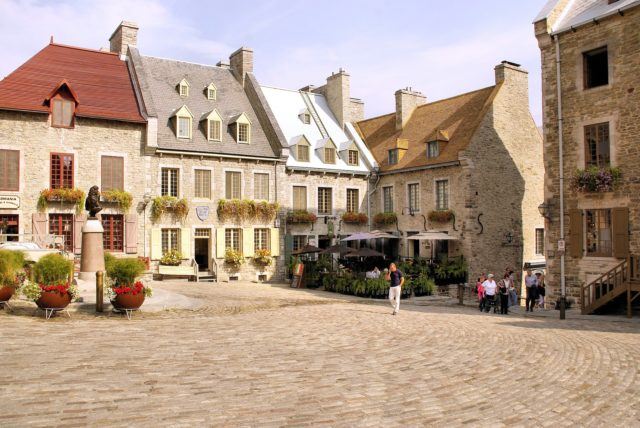
Popular Areas for Brits
Hamilton, Ontario
With a British population of over 15,000 people, Hamilton is also a popular location for Italians, Poles, Indians and the Portuguese. In fact, one in four of the city’s half a million residents are not Canadian born.
The port city is situated on Lake Ontario and has a strong economy centred around the agricultural industry, manufacturing and biosciences.
The city is bisected north and south by the Niagara Escarpment, a formation of bedrock from the Great Lakes Basin named for the falls over which the Niagara river falls some 74km away across the other side of Lake Ontario.
Hamilton has a good school system and offers a range of public and private institutes including the Hamilton Conservatory for the Arts offering a creative programme for ages 3-93. The city has a strong connection with the arts and culture with a thriving theatre scene, two large galleries (McMaster Museum of Art and the Art Gallery of Hamilton) and a plethora of independent galleries and community centres.
The area has around 200 neighbourhoods each offering a different character from Chinatown and downtown to the Irish settlement of Corktown, the grand area of Durand and the landmark area of Balfour in the escarpment.
Brits are drawn to Hamilton for the green and pleasant spaces in this lively city as well as the strong job market and accessible and friendly community.
Vancouver, British Columbia
Though home to a lot of Asian immigrants, Vancouver is also home to Canada’s largest British expat community.
The city has over 610,000 residents and a further 1.7 million within the metro area making it the largest city in British Columbia and the third most populous area in Canada.
Ethnically and culturally diverse, over fifty percent of the population have another language other than English as their native tongue.
Situated to the west of the country, Vancouver is shielded from the Pacific Ocean by Vancouver Island and is nestled between swathes of National Forests and Parks. The North Shore Mountains rise above the cityscape creating a dramatic backdrop for this modern city.
Vancouver was a prominent hub for the British Empire during Edwardian times and much of the architecture in downtown is testament to the past of this Commonwealth nation.
Downtown is reserved exclusively for those who enjoy urban life with a rich density of diverse culinary experiences, vibrant bars and colourful nightlife. The waterfront brings a European feel to the city and the iconic Lions Gate Bridge links the metropolitan bustle to the upmarket and affluent neighbourhood of the North Shore.
Burnaby is home to the city’s university, the retail complex of Metrotown as well as parks and sporting grounds. Surrey, just south of Vancouver is becoming a popular satellite commuter district (particularly for the British) and is known as the ‘City of Parks’ owing to its expansive collection of 80+ green spaces.
With its international airport and colourful diversity, Vancouver is a lively and youthful city that attracts people from across the globe.
London, Ontario
Making up over 13% of the immigrant population in London, there are more than 10,000 Brits in the UK capital’s namesake.
The regional centre of southwest Ontario, London is home to around 360,000 people and is conveniently situated just an hour’s drive from the US border. One of the leading educational seats of Canada, London is home to the University of Western Ontario and attracts academics, scholars and professionals from across the world. The university’s business, medicine, law and engineering schools help to keep the city’s own job market buoyant with the local economy being dependent on medical research, life sciences and biotechnology.
London hosts plenty of festivals throughout the year from international food events, theatre and film festivals to art and world music. The city ranks high in Canada’s ‘liveability’ lists and was recently voted the 4th best Canadian city to live in and the 6th happiest city in the country.
With excellent transport links, good schooling and an affordable cost of living the city is popular with the British community because of its diverse leisure and social scene as well as stable economy. The city has a familiar feel with several green parks and even having its own River Thames.
Edmonton, Alberta
At 2,200 feet above sea level and nestled on the banks of the North Saskatchewan River, Edmonton is home to 900,000 people. Despite its size, the city has a warm, friendly and relaxed atmosphere to it which belies its importance as an economic centre in Alberta and Canada.
The city’s economy is largely built on the oil and gas industry but in recent years has seen major growth in research and education for the technology sector. It is ideally situated as a major distribution hub for the transit of goods north to Alaska as well across North America. Retail also plays a large part in bringing money to the area and the West Edmonton Mall is the largest of its kind on the continent and the 10th largest in the world. In addition to this behemoth of shopping centres, the city has a further dozen major malls, big box shopping centres and retail areas.
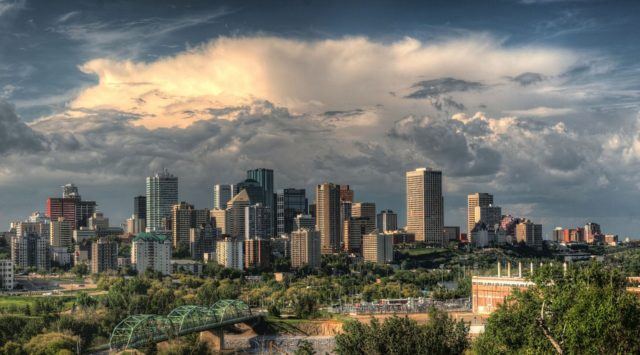
Recreation and leisure are an important part of city life and there is much to experience including museums, galleries, zoos and 13 libraries! Edmonton is also home to several major events and has earned a reputation as the City of Festivals with such spectacles as the Klondike Days event held every summer, the Edmonton International Street Performers Festival and The Works Art & Design Festival.
A sophisticated and modern city that embraces the arts, its culture and historic roots, Edmonton is a popular location for British expats looking for a city with heart that offers affordable living and plenty of opportunities for jobs and leisure.
Surrey, British Columbia
Surrey has a large Indian migrant population of over 70,000 people as well from the Philippines, China and Korea. There are estimated to be around 10,000 British expats.
A suburban city in the metropolitan area of Vancouver surrey comprises six small towns or districts, each having their own unique style. The population has risen at such a pace that most of the houses are new builds and have excellent modern facilities with prices that suit even modest budgets. It is predicted that the population of Surrey will surpass Vancouver by 2030; as a result, construction in the area is set for that growth.
The area has a much higher than average median income per household and this affluence feeds the local economy with confident public spending boosting the service and retail sectors.
The towns themselves are not particularly notable, the area being typical of a North American urban sprawl spilling from nearby Vancouver. There are no historic buildings or landmarks but the communities have been built up specifically to service modern needs and you will not want for lack of facilities.
The people here are very welcoming to newcomers and the area is particularly good for raising a young family due to its excellent schools, great outdoor spaces and friendly community.
Ottawa, Ontario
Again, making up the majority of the immigrant population, Brits number over 17,000 in Canada’s capital city of Ottawa.
The main draw is the abundance of employment opportunities and higher than average salaries. The cost of living is higher than in more rural cities but the quality of life is good. Crime is low, the economy is stable and the environment is pristine clean.
Ottawa has a population of 1.2 million and as such the city provides ample entertainment and leisure pursuits for all. From skiing on Mont Cascades, Mont Ste. Marie or Edelweiss Valley to the huge selection of city parks to enjoy, Gatineau Park with hiking, cycling and swimming to the national museums, galleries, pubs, bars and restaurants.
There is much to commend this capital city and there is plenty of choices available in both schooling and accommodation. Rental prices are higher than the national average but you definitely get what you pay for with the excellent facilities on offer.
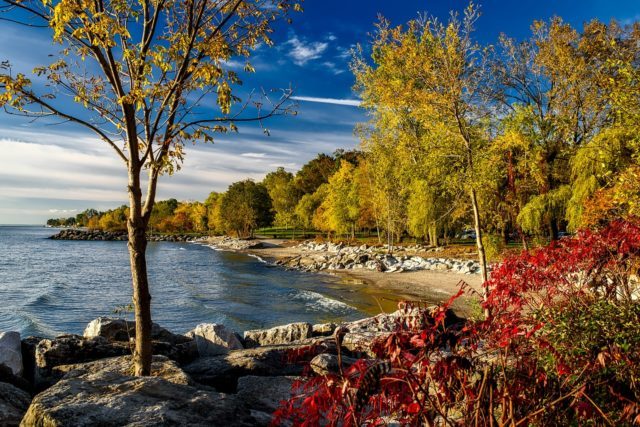
British Communities in Canada
Brits make up a large number of the expat community in Canada totalling around 650,000 people. The spread of this population extends to almost every major city across the country with Ottawa, Toronto and Vancouver being predominant destinations for British migrants.
Some Brits choose a more rural life and smaller communities can be found in more central locations across Alberta, New Brunswick and Nova Scotia. Newfoundland and Labrador are also quite popular with Brits as well as lots of other European nations particularly from Scandinavia. Quebec is more typified with French expats but, due to the continental influence, also attracts large pockets of Brits seeking that uniquely rich combination of French elegance with a North American landscape and culture.
The British High Commission and Consular services in all of the major cities can provide information on the various British expat communities that run in their area.
Canada Essentials
Jobs Economy
Getting a job in Canada can often come down to the qualifications and paperwork you hold rather the experience you have as Canadians tend to place a lot of importance on degrees and the ‘right’ pieces of paper. The job market is very competitive and you will need to push yourself forwards in order to gain an advantage.
The economy in Canada exceeded expectations in 2016 with growth in full time employment with the country experiencing the first trade surplus in two years. The rise in the export markets bolsters the additional 81,000 jobs created which resulted in employment growth of 1.2% for last year.
This follows a slump in the oil sector which has experienced heavy losses over the last few years. Positions in financial services, recreation and tourism continue to experience good growth whilst the technology sector remains stable.
Healthcare
Publicly funded, the healthcare system in Canada is made up of a network of health insurance plans which provide free primary care to citizens only.
Most people have supplementary insurance to cover additional care not covered by the governments plan.
If you are successful in your residency application, then you will be entitle to the same level of care as Canadians. However, foreign nationals visiting the country or staying on working visas should arrange their own healthcare insurance. Many companies provide this as part of their remuneration packages so check the details carefully to ensure that you are (and your family) are adequately covered.
The standard of healthcare in Canada rates quite highly at 31st globally (the UK is 17th and the US is 33rd) with access to hospitals and clinics widely available even in rural locations.
Canadians have a longer life expectancy than their US neighbours due to good healthcare as well as embracing a more active lifestyle. They also have a lower infant mortality rate than the US.
Bringing Kids to Canada
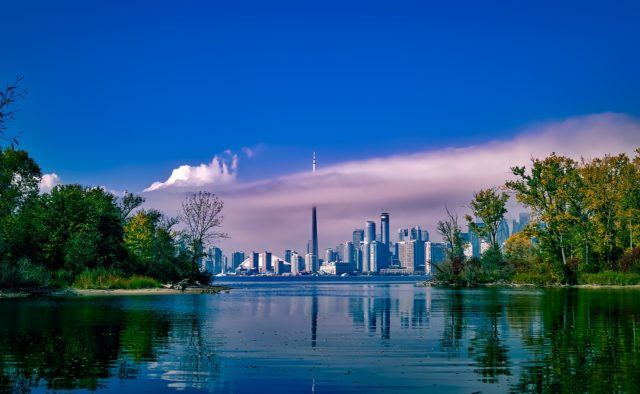
Raising a family in Canada has many benefits over other countries due to the strong schooling system, excellent healthcare and access to an active outdoor lifestyle. The air quality across more than 78% of the country is well below the global average and is almost double the standard of the UK, ranking in the top five countries globally (behind Australia, Estonia and Mauritius).
The transition for children moving from the UK is mostly an easy one owing to the lack of language barriers, a familiar culture and lifestyle as well as the exciting opportunities offered by this welcoming and friendly nation.
Have you started a new life in Canada? Are you considering a move there in the future?
Let us know your thoughts, experiences and recommendations below.

